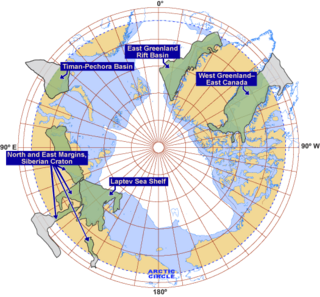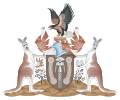Natural ResourcesCanada is the department of the Government of Canada responsible for natural resources, energy, minerals and metals, forests, earth sciences, mapping, and remote sensing. It was formed in 1994 by amalgamating the Department of Energy, Mines and Resources with the Department of Forestry.

The Canadian Association of Petroleum Producers (CAPP), with its head office in Calgary, Alberta, is a lobby group that represents the upstream Canadian oil and natural gas industry. CAPP's members produce "90% of Canada's natural gas and crude oil" and "are an important part of a national industry with revenues of about $100 billion-a-year ."
The Ministry of Energy is a Cabinet-level agency of the government of the Canadian province of Alberta responsible for coordinating policy relating to the development of mineral and energy resources. It is also responsible for assessing and collecting non-renewable resource (NRR) royalties, freehold mineral taxes, rentals, and bonuses. The Alberta Petroleum Marketing Commission, which is fully integrated with the Department of Energy within the ministry, and fully funded by the Crown, accepts delivery of the Crown's royalty share of conventional crude oil and sells it at the current market value. The current ministry was formed in 1986, but ministries with other names dealing with energy resources go back to the Ministry of Lands and Mines in 1930.
The California Department of Conservation is a department within the government of California, belonging to the California Natural Resources Agency. With a team of scientists, engineers, environmental experts, and other specialists, the Department of Conservation administers a variety of programs vital to California's public safety, environment and economy. The department's mission is to manage California's working lands. It regulates oil, natural gas and geothermal wells; studies and maps earthquakes and other geologic phenomena; maps and classifies areas containing mineral deposits; ensures reclamation of land used for mining; and administers agricultural and open-space land conservation programs. A division within the department dedicated to encouraging beverage container recycling has been moved into the newly created Department of Resources Recovery and Recycling (CalRecycle). Despite the similar name, the Department of Conservation should not be confused with the California Conservation Corps, another department within the Natural Resources Agency, which provides work experience for young adults. The Department of Conservation often collaborates with its federal equivalents, such as the U.S. Geological Survey.

The Ministry of Petroleum (MOP) (Persian: وزارت نفت, romanized: Vezârat-e Naft) manages the oil industry, the producer of oil and petrochemical products. MoP is in charge of all issues pertaining to exploration, extraction, exploitation, distribution and exportation of crude oil and oil products. In addition, according to the "Imports and Exports Regulation Act", issuing import licenses for such products is also among the functions of the Ministry of Petroleum. The ministry has been placed under sanctions by the United States Department of State as of 2020.

Exploration for petroleum in the Arctic is expensive and challenging both technically and logistically. In the offshore, sea ice can be a major factor. There have been many discoveries of oil and gas in the several Arctic basins that have seen extensive exploration over past decades but distance from existing infrastructure has often deterred development. Development and production operations in the Arctic offshore as a result of exploration have been limited, with the exception of the Barents and Norwegian seas. In Alaska, exploration subsequent to the discovery of the Prudhoe Bay oilfield has focussed on the onshore and shallow coastal waters.
The Pennsylvania Department of Environmental Protection (DEP) is the agency in the U.S. state of Pennsylvania responsible for protecting and preserving the land, air, water, and public health through enforcement of the state's environmental laws. It was created by Act 18 of 1995, which split the Department of Environmental Resources into the Department of Environmental Protection and the Department of Conservation and Natural Resources. Its current secretary is Rich Negrin.

The Ministry of Petroleum and Natural Gas (MOP&NG) is a ministry of the government of India responsible for the exploration, production, refining, distribution, marketing, import, export, and conservation of petroleum, natural gas, petroleum products, and liquefied natural gas in the country. The ministry is headed by the Cabinet Minister Hardeep Singh Puri. M. M. Kutty is the Secretary of the Ministry. Dharmedndra Pradhan serving as the minister from 26 May 2014 to 7 July 2021 is the longest serving minister till date.
The United States House Natural Resources Subcommittee on Energy and Mineral Resources is one of the five subcommittees within the House Natural Resources Committee

The Gubkin Russian State University of Oil and Gas is a public university in Moscow, Russia. The university was founded in 1930 and is named after the geologist Ivan Gubkin. The university is colloquially known as Kerosinka, meaning 'kerosene stove'.
The Energy Resources Conservation Board (ERCB) was an independent, quasi-judicial agency of the Government of Alberta. It regulated the safe, responsible, and efficient development of Alberta's energy resources: oil, natural gas, oil sands, coal, and pipelines. Led by eight Board members, the ERCB's team of engineers, geologists, technicians, economists, and other professionals served Albertans from thirteen locations across the province.

Energy laws govern the use and taxation of energy, both renewable and non-renewable. These laws are the primary authorities related to energy. In contrast, energy policy refers to the policy and politics of energy.
The Alaska Oil and Gas Conservation Commission (AOGCC) is a quasi-judicial agency in the U.S. state of Alaska, within Alaska's Department of Administration. It was originally established in 1955, was subsequently abolished, but was eventually reestablished. This Commission is responsible for overseeing oil and gas drilling and production, reservoir depletion, and certain other operations on private and state-owned lands in Alaska.

Mining in New Zealand began when the Māori quarried rock such as argillite in times prior to European colonisation. Mining by Europeans began in the latter half of the 19th century.

The New Mexico Energy, Minerals and Natural Resources Department (EMNRD) is a state agency in New Mexico tasked with managing and protecting the natural and energy resources of New Mexico.

There are many exemptions for fracking under United States federal law: the oil and gas industries are exempt or excluded from certain sections of a number of the major federal environmental laws. These laws range from protecting clean water and air, to preventing the release of toxic substances and chemicals into the environment: the Clean Air Act, Clean Water Act, Safe Drinking Water Act, National Environmental Policy Act, Resource Conservation and Recovery Act, Emergency Planning and Community Right-to-Know Act, and the Comprehensive Environmental Response, Compensation, and Liability Act, commonly known as Superfund.

The Alberta Energy Regulator (AER) is a Canadian crown corporation responsible for regulating the development of energy resources in Alberta. Headquartered in Calgary, Alberta, the AER's mandate under the Responsible Energy Development Act (REDA), passed on 10 December 2012 and proclaimed on 17 June 2013, is to provide safe, efficient, orderly, and environmentally responsible development of energy resources in the province.
The Northwest Territories Oil and Gas Operations Act is a legislation that legally gives the Government of the Northwest Territories the right to govern onshore “exploration, production, processing and transportation of oil and gas resources in the Northwest Territories”.

The Federal Ministry of Petroleum Resources is a part of the Federal Ministries of Nigeria that directs petroleum resources and its activities in Nigeria. The President, Bola Tinubu is the current minister of petroleum.
The Secretary of State for Energy is a senior official within the Ministry for the Ecological Transition of the Government of Spain. The Secretary of State is appointed by the Monarch after being nominated by the Council of Ministers with the advice of the Minister for the Ecological Transition.












